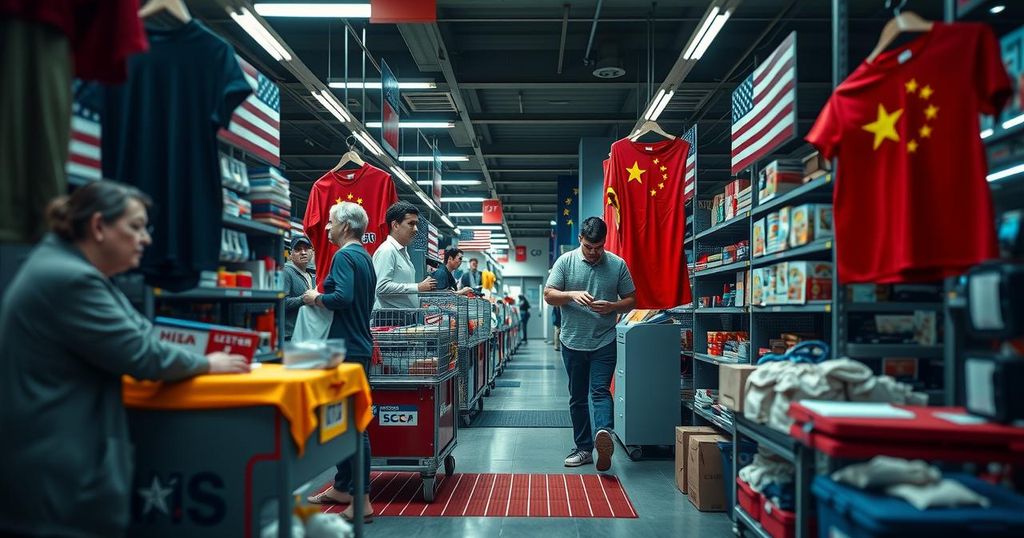The Impact of Foreign-Made Merchandise on U.S. Election Support
As the 2024 U.S. presidential election nears, cheap Chinese-made election merchandise floods the market, prompting challenges for American manufacturers. Despite candidates promoting Made in the USA products, supporters often purchase affordable foreign items, creating a conflict with their intended advocacy for U.S. manufacturing. This situation highlights the complexities of consumer choices in the context of economic policies.
As the presidential election season intensifies in the United States, voters increasingly showcase their support for candidates through various election-themed merchandise. However, a significant portion of such items, including iconic phrases like “Make America Great Again” or slogans for Vice President Kamala Harris, are often made in China. The entry of affordable Chinese products into the U.S. market, facilitated by e-commerce platforms, presents considerable challenges for American manufacturers. Ben Waxman, the founder of American Roots, highlighted the plight of U.S. producers, asserting that the influx of Chinese goods is severely affecting their competitiveness. While his company produces American-made campaign apparel, selling T-shirts for approximately $15, equivalent products on platforms like Temu can be purchased for as little as $3. “It’s more expensive when you pay higher wages, living wages, and abide by environmental standards,” Waxman noted, reflecting the operational costs tied to ethical manufacturing practices. The scope of the problem manifests in the overwhelming presence of Chinese-made election merchandise on e-commerce sites such as Amazon and eBay. For instance, a Trump campaign hat is priced at $40 on official channels, whereas a similar item can be found for under $4 on Temu. This stark price difference illustrates the ongoing struggle the U.S. textile industry faces in constricting its reliance on low-cost imports. Kim Glas, the president of the National Council of Textile Organizations, shed light on the adverse consequences of the de minimis loophole, which permits goods valued under $800 to enter the U.S. without incurring import duties. She expressed concern over the loss of American manufacturing operations and noted a decline in campaign product sales during the current election cycle compared to previous years. The situation becomes more ironic as presidential candidates, who publicly advocate for fair trade practices and domestic manufacturing, indirectly lead their supporters to purchase foreign-made goods. Mitch Cahn, president of Unionwear, remarked on this contradiction, stating, “If someone is supporting a candidate because of that candidate’s economic policy and their position toward improving our economy… and then they’re supporting a candidate by buying a product that’s made in a country that stands for the opposite of that, they’re actually doing themselves and the candidate and the economy a disservice.” In light of these developments, the market dynamics for election merchandise reveal a complex interplay between global supply chains and domestic manufacturing, calling for a reevaluation of purchasing choices among consumers who prioritize supporting local economies.
As the 2024 U.S. presidential election approaches, the apparel and merchandise market is witnessing an influx of foreign-made products, particularly from China. This situation has prompted considerable concern among American manufacturers who struggle to compete with the lower prices of imported goods. The availability of these items on popular e-commerce platforms contrasts sharply with the ethos of promoting American-made products, especially in the context of ongoing debates around trade, manufacturing jobs, and economic policies influenced by the electoral candidates themselves. Manufacturers argue that this trend undermines their businesses and the broader economic fabric of the nation, posing questions about consumer choices and economic patriotism.
In conclusion, the proliferation of Chinese-made election merchandise in the U.S. market raises important questions about consumer awareness, economic policies, and the support of domestic manufacturing. Despite the appeals from presidential candidates advocating for American-made products, the reality of affordable Chinese imports complicates this narrative. The ongoing adversities faced by U.S. manufacturers serve as a call to action for consumers to consider the implications of their purchasing decisions on the economy and local businesses.
Original Source: www.voanews.com




Post Comment